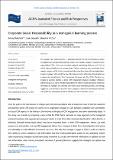Corporate social responsibility as a managerial learning process
Abstract
The purpose of this paper is twofold. 1) We propose for the first time in the literature a theory (managerial learning hypothesis) that may explain why managers engage in corporate social responsibility (CSR). 2) We use an intuitive empirical methodology (Edmans et al. 2017) to test the relevance/irrelevance of our new theory. The idea behind our main contribution is that managers engage in CSR to learn new relevant information from other informed stakeholders. In return, managers will use both the new information and other information they already have to choose the optimal level of firm’s investment (Jayaraman and Wu, 2019). Therefore, we propose to examine whether a strong CSR engagement improves revelatory efficiency (Edmans et al. 2012, 2017). The latter accounts for the extent to which stock prices reveal new information to managers that will help them make value-maximizing choices. Our findings suggest that CSR activities do not allow firm’s managers to extract new information from their stock prices and ultimately improve the efficiency of their investment choices.
Citation
Marhfor , A , Bouslah , K & M'Zali , B 2021 , ' Corporate social responsibility as a managerial learning process ' , Journal of Finance and Risk Perspectives , vol. 10 , pp. 77-94 . https://doi.org/10.35944/jofrp.2021.10.1.005
Publication
Journal of Finance and Risk Perspectives
Status
Peer reviewed
ISSN
2305-7394Type
Journal article
Collections
Items in the St Andrews Research Repository are protected by copyright, with all rights reserved, unless otherwise indicated.

